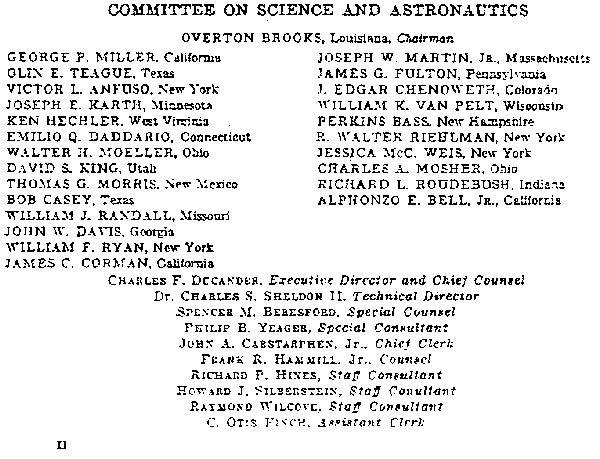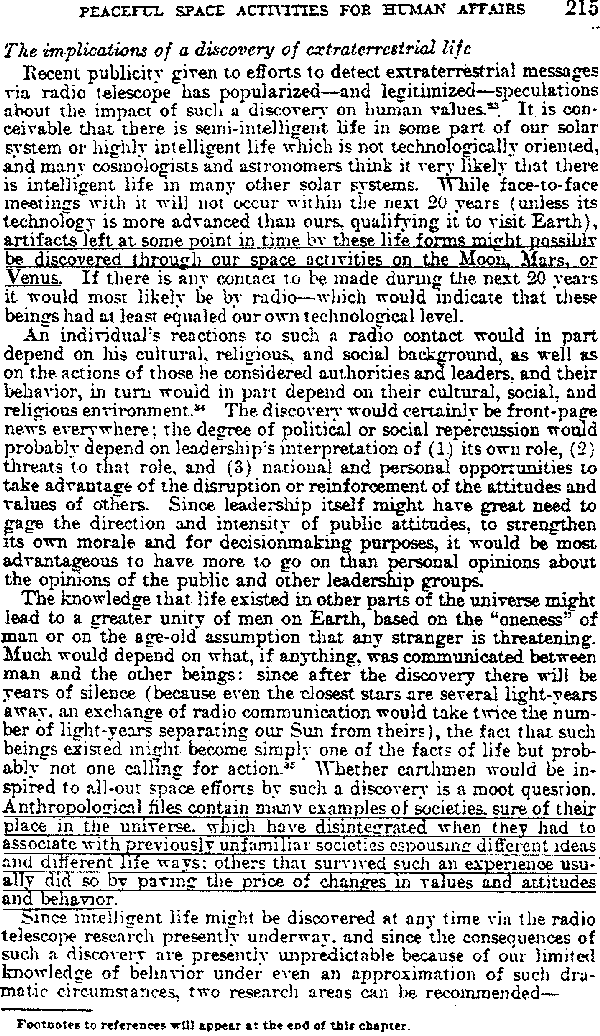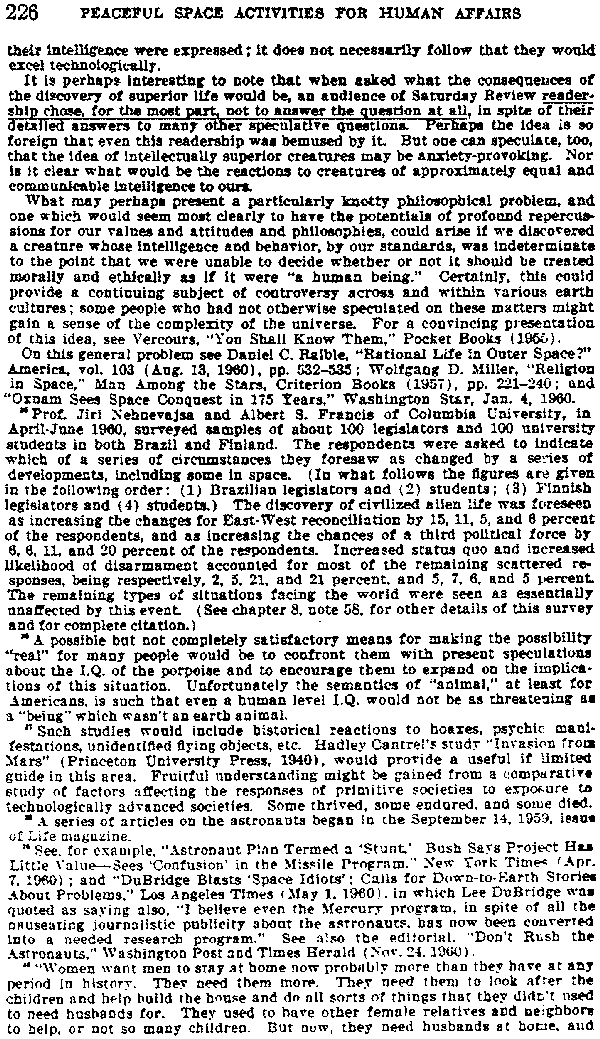| Subject: Brookings Report, 1960
Date: Sun, 16 Jul 2006 07:38:09 -0500 From: Francis Ridge <nicap@insightbb.com> Cat: 0
On December 14, 1960, The Brookings Research Institute
in Washington released a report prepared during 1960 for NASA entitled
"Proposed Studies on the Implications of Peaceful Space Activities for
Human Affairs", including a section entitled "Implications of a Discovery
of Extraterrestrial Life". (Commonly referred to as "the Brookings Institute
report".) The report discusses effects of meeting extraterrestrial life:
"It is possible that if the intelligence of these creatures were sufficiently
superior to ours, they would choose to have little if any contact with
us. . . " (New York Times, Dec. 15, 1960) The original site for the
219-page report and the 50-page summary is listed below. For security reasons,
if the site would go down, the NICAP site also hosts the full documents,
also listed below. The article in the NICAP UFO Investigator that announced
the release of the report in its Dec/Jan issue is produced below. Recently
added is the New York Times article transcript,
New York Times article (transcript only)  UFOI, Vol. I, No. II (Dec 1960 - Jan 1961 issue) The discovery of intelligent space beings could have a severe effect on the public, according to a research report released by the National Aeronautics and Space Administration. The report warned that America should prepare to meet the psychological impact of such a revelation. The 190-page report was the result of a $96,000 one-year study conducted by the Brookings Institution for NASA's long-range study committee. Public realization that intelligent beings live on
other planets could bring about profound changes, or even the collapse
of our civilization, the research report stated.
Although the research group did not expect any immediate contact with other planet beings, it said that the discovery of intelligent space races "could nevertheless happen at any time." Even though the UFO problem was not indicated as a reason for the study, it undoubtedly was an important factor. Fear of public reaction to an admission of UFO reality was cited as the main reason for secrecy in the early years of the AF investigation. (Confirmed to NICAP's present director in 1952-3, when the AF was planning to release important UFO reports, also the famous Utah motion-pictures of a UFO formation.) Radio communication probably would be the first proof of other intelligent life, says the NASA report. It adds: "Evidences of its existence might also be found in artifacts left on the moon or other planets." This report gives weight to previous thinking by scholars
who have suggested that the earth already may be under close scrutiny by
advanced space races. In 1958, Prof. Harold D. Lasswell of the Yale Law
School stated:
|
||||||||||
| Brookings Report - The NY Times 12/15/1960
Dateline: The New York Times, Thursday, December 15, 1960 Mankind is warned to Prepare for Discovery of Life in Space - Brookings Institution Report Says Earth's Civilization Might Topple if faced by a Race of Superior Beings Washington. Dec 14 (UPI) -- Discovery of life on other worlds could cause the earth's civilization to collapse, a Federal report said today. This warning was contained in a research report given to the National Aeronautical and Space Administration with the recommendation that the world prepare itself mentally for the eventuality. The report, prepared by the Brookings Institution, said "while the discovery of intelligent life in other parts of the universe is not likely in the immediate future, it could nevertheless, happen at any time." Discovery of Intelligent beings on other planets could lead to an all-out effort by earth to contact them, or it could lead to sweeping changes or even the downfall of civilization, the report said. Even on earth, it added, "societies sure of their own place have disintegrated when confronted by a superior society, and others have survived even though changed." Responding to Crisis "Clearly, the better we can come to understanding the factors involved in responding to such crisis the better prepared we may be." The agency's 100-page report, prepared at a cost of $86,000 was for the space agency's committee on beings-in-space studies. The members, headed by Donald M. Michael also recommended further study of other space activities, including the symptomatic and propaganda effects and the implications of communications and weather satellites. On the question of life in outer space, the report said that if intelligent or super-intelligent beings were discovered in the next twenty years they would probably be found by radio communications with other solar systems. Evidence of such existence "might also be found in artifacts left on the moon or other planets," it said. An attempt already has been made to contact outer space. Government scientist at Greenbank, West Virginia used radio astronomy in an effort to pick up signals that might have been beamed by intelligent beings. They concentrated on a star about fifteen light years away. Signals were sent from Greenbank were of a kind that would show to anyone receiving on other planets that they were man-made and not natural phenomena. Back to the Brookings Page NICAP Home Page
|
||||||||||
|
..
|









